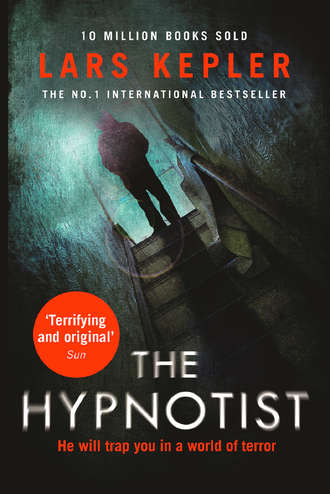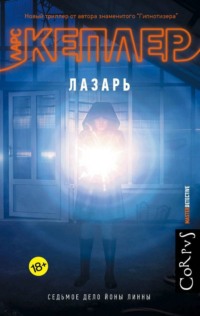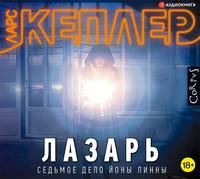
Полная версия
The Hypnotist
He is lying on his back, his mouth tightly closed; his stomach is moving rapidly up and down, and his fingers twitch from time to time.
“I was right when I said the perpetrator started at the football pitch,” says Joona. “He murdered Anders Ek first. Then he went to the house and killed Lisa, the little girl, thought he killed the boy, and killed Katja, the mother.”
“Has the pathologist confirmed that?”
“Yes,” replies Joona.
“I see.”
“So if the killer’s intention is to eliminate the entire family,” Joona goes on, “only the older daughter remains. Evelyn.”
“Unless he’s found out the boy is still alive,” says Erik.
“Exactly, but we can protect him.”
“Yes.”
“We have to find the killer before he can get to Evelyn,” says Joona. He looks Erik directly in the eye. “I need to find out what the boy knows.”
“And I need to do what’s in the best interests of the patient.”
“Perhaps it’s in his best interests not to lose his sister.”
“That occurred to me as well; I’ll have another look at him, of course,” says Erik. “But I’m fairly sure it’s too early. That said, I believe the patient will regain consciousness quite soon, within just a few hours, at least to the extent that we’ll be able to start talking to him. But after that point, you have to understand that we have a lengthy therapeutic process ahead of us. An interrogation could damage the boy’s condition.”
Daniella walks over briskly, wearing a snug red coat. She hands the patient’s file to Erik.
“Erik, it doesn’t matter what we think. The prosecutor has already decided that special circumstances apply.”
Erik turns and looks inquiringly at Joona. “So you don’t need our consent?” he asks.
“No,” answers Joona.
“So what are you waiting for?”
“I think Josef has already suffered more than anyone should have to suffer,” says Joona. “I don’t want to put him through anything that might harm him. But at the same time I have to find his sister before the killer does. And that boy saw the attacker’s face. If you won’t help me find out what he knows, I’ll do it myself, but obviously I prefer the better way.”
“Which is?”
“Hypnosis,” replies Joona.
Erik looks at him. “I don’t even have permission to hypnotise—”
“I’ve spoken to Annika Lorentzon,” says Daniella.
“What did she say?” asks Erik.
“It’s hardly a popular decision, permitting an unstable patient to be hypnotised, a child into the bargain. But since I am responsible for the patient, she has left the final judgment to me,” Daniella tells him.
Erik exhales, then rubs his eyes with his fingers. “I really want to get out of this.”
“If you don’t mind my saying so, your reluctance to use hypnosis seems to go beyond your prudent concern for the patient’s well-being,” says Joona.
“I have no intention of discussing the matter, but I promised ten years ago never to use hypnosis again. It was a decision on my part that I still think was the right one.”
“Is it right in this case?” asks Joona.
“To be honest, I don’t know.”
“Make an exception,” implores Daniella.
“Hypnosis, then.” Erik sighs.
“I’d like you to make an attempt as soon as you feel the patient is in any way receptive to hypnosis,” says Daniella.
“It would be good if you were here,” says Erik.
“I’ve made the decision with regard to hypnosis,” she explains, “on condition that you then take over responsibility for the patient.”
“So I’m on my own now?”
Daniella looks at him, exhausted. “I’ve worked all night,” she says. “I’d promised to take my daughter to school, I blew that off, and I’m going to have to deal with that tonight. But right now I have to go home and sleep.”
16
tuesday, december 8: morning
Erik watches Daniella Richards walk down the corridor, red coat flapping behind her. Joona looks in at the patient. Erik goes to the bathroom, locks the door, washes and dries his face. He takes out his phone and calls Simone, but there is no reply. He tries his home number and listens to the phone ringing, but when the answering machine kicks in, he no longer knows what to say: “Sixan, I … you have to listen to me, I don’t know what you’re thinking, but nothing’s happened, maybe you don’t care, but I promise I’m going to find a way to prove to you that I’m—”
Erik stops speaking. What’s the point? He knows his assurances no longer have any meaning. He lied to her ten years ago, and he still hasn’t managed to prove his love, not sufficiently, not enough for her to begin to trust him again. He ends the call, leaves the bathroom, and walks over to where the detective is gazing into the patient’s room.
“What is hypnosis, actually?” Joona asks, after a while.
“It’s just an altered state of consciousness, coupled with suggestion and meditation,” Erik replies. “From a purely neurophysiological point of view, the brain functions in a particular way under hypnosis. Parts of the brain that we rarely use are suddenly activated. People under hypnosis are very deeply relaxed. It almost looks as if they’re asleep, but if you do an EEG the brain activity shows a person who is awake and alert.”
“I see,” Joona says hesitantly.
“When people think of hypnosis, they usually mean heterohypnosis, where one person hypnotises another with some purpose in mind.”
“Such as?”
“Such as evoking negative hallucinations, for example.”
“What’s that?”
“The most common is that you inhibit the conscious registration of pain.”
“But the pain is still there.”
“That depends on how you define it,” Erik replies. “Of course the patient responds to pain with physiological reactions, but he experiences no feeling; it’s even possible to carry out surgery under clinical hypnosis.”
Joona writes something down in his notebook. “The boy opens his eyes from time to time,” he says, looking through the window again.
“I’ve noticed.”
“What’s going to happen now?”
“To the patient?”
“Yes, when you hypnotise him.”
“During dynamic hypnosis, in a therapeutic context, the patient almost always splits himself into an observing self and one or more experiencing and acting selves.”
“He’s watching himself, like in a theatre?”
“Yes.”
“What are you going to say to him?”
“Well, he’s experienced terrible things, so first of all I have to make him feel secure. I begin by explaining what I’m going to do, and then I move on to relaxation. I talk in a very calm voice about his eyelids feeling heavier, about wanting to close his eyes, about breathing deeply through his nose. I go through the body from head to toe; then I work my way back up again.”
Erik waits while Joona takes notes.
“After that comes what’s called the induction,” says Erik. “I insert a kind of hidden command into what I say and get the patient to imagine places and simple events. I suggest a walk in his thoughts, further and further away, until his need to control the situation almost disappears. It’s a little bit like when you’re reading a book and it gets so exciting that you’re no longer aware of the fact that you’re sitting reading.”
“I understand.”
“If you lift the patient’s hand like this and then let go, the hand should stay where it is, in the air, cataleptic, when the induction is over,” Erik explains. “After the induction I count backwards and deepen the hypnosis further. I usually count, but others ask the patient to visualise a grey scale, in order to dissolve the boundaries in his mind. What is actually taking place on a practical level is that the fear, or the critical way of thinking that is blocking certain memories, is put out of action.”
“Will you be able to hypnotise him?”
“If he doesn’t resist.”
“What happens then?” asks Joona. “What happens if he does resist?”
Erik studies the boy through the window in the door, trying to read the boy’s face, his receptiveness.
“It’s difficult to say what I’ll get out of him. It could be of very variable relevance,” he says.
“I’m not after a witness statement. I just want a hint, a clue, something to go on.”
“So all you want me to look for is the person who did this to them?”
“A name or a place would be good, some kind of connection.”
“I have no idea how this is going to go,” says Erik, taking a deep breath.
17
tuesday, december 8: morning
Joona goes into the recovery room with Erik, sits on a chair in the corner, slips off his shoes, and leans back. Erik dims the light, pulls up a metal stool, and sits down next to the bed. Carefully he begins to explain to the boy that he wants to hypnotise him in order to help him understand what happened yesterday.
“Josef, I’m going to be sitting here the whole time,” says Erik calmly. “There is absolutely nothing to be afraid of. You can feel completely safe. I’m here for your sake. You don’t have to say anything you don’t want to say, and you can bring the hypnosis to an end whenever you want to.”
Only now, his heart pounding, does Erik begin to realise how much he has longed to do this. He must try to curb his enthusiasm. The pace of events must not be forced or hurried along. It must be filled with stillness; it must be allowed to slow down and be experienced at its own gentle tempo.
He immediately feels how receptive Josef is; his injured face grows heavier, the features fill out, and his mouth relaxes. It’s as if the boy intuitively clings to the security Erik conveys. It’s easy to get the boy into a state of deep relaxation; the body has already been at rest and seems to long for more.
When Erik begins the induction, it is as if he never stopped practising hypnosis; his voice is close, calm, and matter-of-fact, and the words come so easily they pour out, suffused with monotonous warmth and a somnolent, falling cadence.
“Josef, if you’d like to … think of a summer’s day,” says Erik. “Everything is pleasant and wonderful. You are lying in the bottom of a little wooden boat, bobbing gently. You can hear the lapping of the water, and you are gazing up at little white clouds drifting across the blue sky.”
The boy responds so well that Erik wonders if he ought to slow things down a little bit. Difficult events can increase sensitivity when it comes to hypnosis. Inner stress can function like an engine in reverse: the braking action happens unexpectedly fast and the rev count very quickly drops to zero.
“I’m going to start counting backwards now, and with each number you hear you will relax a little more. You will feel yourself being filled with great calm; you will be aware of how pleasant everything around you is. Relax from your toes, your ankles, your calves. Nothing bothers you; everything is peaceful. The only thing you need to listen to is my voice, the numbers counting down. Now you are relaxing even more, you feel even heavier, your knees relax, along your thighs to your groin. Feel yourself sinking downwards at the same time, gently and pleasantly. Everything is calm and still and relaxed.”
Erik rests a hand on Josef’s shoulder. He keeps his gaze fixed on the boy’s stomach, and with every exhalation he counts backwards. Erik had almost forgotten the feeling of dreamlike lightness and physical strength that fills him as the process runs its course. As he counts he can see himself sinking through bright, oxygen-rich water. Smiling, he drifts down past a vast rock formation, a continental fissure that continues down towards immense depths, the water glittering with tiny bubbles. Filled with happiness, he descends along the rough wall of rock. As Erik falls through the bright water, he reaches out an arm, grazing the rock with his fingers as he passes. The bright water shifts slowly into shades of pink.
The boy is showing clear signs of hypnotic rest. An expression of great relaxation has settled over his cheeks and mouth. Erik has always thought that a patient’s face becomes broader, somehow flatter. Less attractive but more fragile, and without any trace of pretence.
“Now you are deeply relaxed,” says Erik calmly. “Everything is very, very pleasant.”
The boy’s eyes gleam behind the half-closed lids.
“Josef, I want you to try and remember what happened yesterday. It started just like an ordinary Monday, but in the evening someone comes to the house.”
The boy is silent.
“Now you’re going to tell me what’s happening,” says Erik.
The boy responds with the faintest of nods.
“You’re sitting in your room? Is that what you’re doing? Are you listening to music?”
There is no reply. His mouth moves, asking, seeking.
“Your mum was at home when you got back from school,” says Erik.
He nods.
“Do you know why? Is it because Lisa has a temperature?”
The boy nods and moistens his lips.
“What do you do when you get home from school, Josef?”
The boy whispers something.
“I can’t hear,” Erik urges gently. “I want you to speak so I can hear you.”
The boy’s lips move again, and Erik leans forward.
“Like fire, just like fire,” Josef mumbles. “I’m trying to blink. I go into the kitchen, but it isn’t right; there’s a crackling noise between the chairs and a bright red fire is spreading across the floor.”
“Where is the fire coming from?” asks Erik.
“I don’t remember. Something happened before …” He falls silent again.
“Go back a little, before the fire in the kitchen,” says Erik.
“There’s someone there,” says the boy. “I can hear someone knocking at the door.”
“The outside door?”
“I don’t know.” The boy’s face suddenly grows tense, he whimpers anxiously, and his lower teeth are exposed in a strange grimace.
“There’s no danger now,” Erik says. “There’s no danger, Josef, you’re safe here, you’re calm, you feel no anxiety. You are simply watching what is happening; you are not there. You can see it all from a safe distance, and it isn’t dangerous at all.”
“The feet are pale blue,” the boy whispers.
“What did you say?”
“Someone’s knocking at the door,” the boy says, slurring his words. “I open it but there’s no one there; I can’t see anyone there. But the knocking keeps coming. Someone’s playing a trick on me.” The patient is breathing more rapidly, his stomach moving jerkily.
“What happens now?” asks Erik.
“I go into the kitchen to get a sandwich.”
“You eat a sandwich?”
“But now the knocking starts again, the noise is coming from Lisa’s room. The door is open a little. I can see that her lamp is on. I carefully push the door open with the knife and look in. She’s on her bed. She has her glasses on, but her eyes are shut and she’s panting. Her face is white. Her arms and legs are totally stiff. Then she throws her head back so her throat is stretched right out, and she starts to kick the bottom of the bed with her feet. She just keeps kicking, faster and faster. I tell her to stop, but she keeps kicking, harder. I yell at her but the knife has already started to stab and Mum rushes in and pulls at me and I spin around and the knife moves forward; it just pours out of me; I need to get more knives, I’m afraid to stop, I have to keep going, it’s impossible to stop. Mum is crawling across the kitchen floor, it’s all red, I have to try the knives on everything, on me, on the furniture, on the walls; I hit and stab and then suddenly I’m really tired and I lie down. I don’t know what’s happening, my body hurts inside and I’m thirsty, but I just can’t move.”
Erik stays with the boy, down there in the bright water, their legs moving gently. He follows the wall of rock with his eyes, further and further down, endlessly, the water gradually turning darker, blue fading to blue-grey and then, temptingly, to black.
“You had seen,” asks Erik, hearing his own voice tremble, “you had seen your father earlier?”
“Yes, down at the football pitch,” Josef replies.
He falls silent, looks unsure, stares straight ahead with his sleeping eyes.
Erik sees that the boy’s pulse rate is increasing and realises that his blood pressure is dropping at the same time.
“I want you to sink deeper now,” Erik says softly. “You’re sinking, you’re feeling calmer, better, and—”
“Not Mum?” asks the boy, in a feeble voice.
Erik risks a guess. “Josef, tell me, did you see your older sister, Evelyn, as well?”
He observes the boy’s face, aware that, if he’s wrong, the conjecture can create a rift in the hypnosis. But he feels he must take the leap, because if the patient’s condition begins to deteriorate again he will have to stop completely.
“What happened when you saw Evelyn?” he asks.
“I should never have gone out there.”
“Was that yesterday?”
“She was hiding in the cottage,” the boy whispers, smiling.
“What cottage?”
“Auntie Sonja’s,” he says.
“Tell me what happens at the cottage.”
“I just stand there. Evelyn isn’t pleased. I know what she’s thinking,” he mumbles. “I’m just a dog to her. I’m not worth anything …”
The smile is gone. Tears stream from Josef’s eyes, and his mouth is trembling.
“Is that what Evelyn says to you?”
“I don’t want to, I don’t have to, I don’t want to,” whimpers Josef.
“What is it you don’t want to do?”
His eyelids begin to twitch spasmodically.
“What’s happening, Josef?”
“She says I have to bite and bite to get my reward.”
“Who? Who do you have to bite?”
“There’s a picture in the cottage, a picture in a frame that looks like a toadstool. It’s Dad, Mum, and Lisa, but—”
His body suddenly tenses, his legs move quickly and limply, he is rising out of the depths of hypnosis. Carefully, Erik slows his ascent, calming him before raising him a few levels. Meticulously, he closes the door on all memory of the day and all memory of the hypnosis. Nothing must be left open, once he begins the careful process of waking him up.
Josef is lying there smiling when Erik finally moves away from his bedside and leaves the room. He goes over to the coffee machine. A feeling of desolation overwhelms him, a sense that something is irrevocably wrong. He glances up when the door to the boy’s room opens. The detective strolls over to join him.
“I’m impressed,” says Joona quietly, getting out his cell phone.
“Before you make any calls, I just want to stress one thing,” says Erik. “The patient always speaks the truth under hypnosis. But it’s only a matter of what he himself perceives as the truth. His memory is as subjective as ever, and—”
“I understand that.”
“I’ve hypnotised people suffering from schizophrenia,” Erik goes on, “and they were just as deeply detached from reality under hypnosis as they were in a conscious state.”
“What is it you’re trying to say?”
“Josef talked about his sister.”
“Yes, she wanted him to bite like a dog and so on,” says Joona. He dials a number and puts the phone to his ear.
“There’s no proof his sister told him to do that,” Erik explains.
“But she might have,” says Joona, raising a hand to silence Erik. “Anja, my little treasure.”
A soft voice can be heard at the other end of the phone.
“Can you check on something for me? … Yes, exactly. Josef Ek has an aunt called Sonja, and she has a house or a cottage somewhere … Yes, that’s—you’re a star.” Joona looks up at Erik. “Sorry. You wanted to say something else?”
“Just that it’s by no means certain it was Josef who murdered the family.”
“But is it possible that his wounds are self-inflicted? Could he have cut himself like this in your opinion?”
“Not likely.”
“But is it possible?” Joona persists.
“Theoretically, yes,” Erik replies.
“Then I think our killer’s lying in there,” says Joona.
“I think so too.”
“Is he in any condition to run away from the hospital?”
“No.” Erik smiles weakly in surprise.
Joona heads for the door.
“Are you going to the aunt’s cottage?” asks Erik.
“Yes.”
“I could come with you,” says Erik. “The sister could be injured, or she could be in a state of shock.”
18
tuesday, december 8: early morning
Simone is already awake before the telephone on Erik’s bedside table starts to ring.
Erik mumbles something about balloons and streamers, picks up the phone, and hurries out of the room, closing the door behind him.
The voice she hears through the door sounds sympathetic, almost tender. After a while, Erik creeps back into the bedroom and she asks who called.
“Police … a detective … I didn’t catch his name,” he says, and explains that he has to go to Karolinska University Hospital.
She looks at the alarm clock and closes her eyes.
“Sleep now, Sixan,” he whispers, and leaves the room.
Her nightgown has twisted itself awkwardly around her. Unwinding and yanking it into place, she turns onto her side and lies still, listening to Erik’s movements.
He dresses quickly, then goes rummaging for something in the wardrobe. Next, she hears a metallic ping when he tosses the shoehorn back into the drawer. After a little while she hears the faint sound of the street door closing.
She tries for a long time to get back to sleep, but without success. She doesn’t think it sounded as if Erik was talking to a police officer. He sounded too relaxed. Maybe, she tells herself, he was just tired.
She gets up to pee, has a yoghurt drink, and goes back to bed. Then she starts to think about what happened ten years ago, and all chance of sleep is gone. She lies there for half an hour, and then, unable to resist her suspicions, switches on the bedside light, picks up the phone, and thumbs through the display to find the last incoming call. She stares at the number for a moment, knowing she ought to turn off the light and go back to sleep, but finally she calls the number anyway. It rings three times, there is a click, and she hears a woman laughing a short distance away from the phone.
“Stop it, Erik,” says the woman happily, and then the voice is very close. “Daniella Richards. Hello?”
Simone says nothing. The woman waits a bit, then says aloha in a wearily sarcastic voice before ending the call. Simone remains sitting there, telephone in hand. She tries to understand why Erik said it was a police officer, a male police officer, who rang. She wants to find a reasonable explanation, but she can’t stop her thoughts from finding their way back to that time ten years ago when she suddenly realised that Erik was deceiving her.
It just happened to have been the same day Erik informed her that he was finished with hypnosis forever.
Simone remembers that she hadn’t been at her newly opened gallery that day, a rare occasion; maybe Benjamin wasn’t in school, maybe she’d taken the day off, but at any rate she was sitting at the kitchen table in the terrace house in Järfälla going through the mail when she caught sight of a pale blue envelope addressed to Erik. The sender’s name on the back simply said: Maja.
There are times when you know with every fibre of your being that something is wrong.
Simone had been married to Erik for eight years when, fingers trembling, she opened the envelope from Maja. Ten colour photographs fell out onto the kitchen table. The pictures had not been taken by a professional photographer. Blurred close-ups: a woman’s breast, a mouth and a naked throat, pale green underwear, black hair in tight curls. Erik was in one of the pictures. He looked surprised and happy.
Maja was a pretty, very young woman with dark, strong eyebrows and a large, serious mouth. In the only photo that showed her completely, she was lying on a narrow bed dressed in just her underwear, strands of black hair falling over her broad white breasts. She looked happy, too, a faint blush high on her cheeks.









